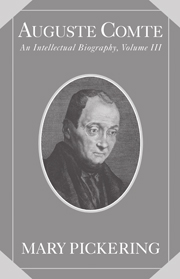Book contents
- Frontmatter
- Contents
- Acknowledgments
- Abbreviations and Notes
- Introduction
- 1 The Coup d'Etat and Its Consequences
- 2 Comte's Stumblings
- 3 The Vicissitudes of Positivism during the Early Empire
- 4 Système de politique positive: Natural and Social Philosophy
- 5 Système de politique positive: Comte's Philosophy of History
- 6 Système de politique positive: Comte's Utopia
- 7 The Last Years: Politics and Propaganda
- 8 The Last Flurry of Activity: The Testament and Synthèse subjective
- 9 The Death of the Great Priest of Humanity and His Influence
- Conclusion
- Bibliography
- Index
- References
9 - The Death of the Great Priest of Humanity and His Influence
Published online by Cambridge University Press: 06 January 2010
- Frontmatter
- Contents
- Acknowledgments
- Abbreviations and Notes
- Introduction
- 1 The Coup d'Etat and Its Consequences
- 2 Comte's Stumblings
- 3 The Vicissitudes of Positivism during the Early Empire
- 4 Système de politique positive: Natural and Social Philosophy
- 5 Système de politique positive: Comte's Philosophy of History
- 6 Système de politique positive: Comte's Utopia
- 7 The Last Years: Politics and Propaganda
- 8 The Last Flurry of Activity: The Testament and Synthèse subjective
- 9 The Death of the Great Priest of Humanity and His Influence
- Conclusion
- Bibliography
- Index
- References
Summary
I saw in a Liverpool paper an announcement from a French paper of the death of Comte. It seems as if there would be no thinkers left in the world.
John Stuart Mill to Harriet Mill, September 16, 1857THE DEATH OF VIEILLARD AND COMTE'S UNRAVELING
In the spring of 1857, Comte was gratified to hear from Vieillard that “all the serious men of our government” regarded positivism as “the only possible guide for the near future.” Napoleon III had even read Comte's proposition at the end of the Appel and admitted to Vieillard that neither he nor his wife really believed their son would ever take over. Comte gave Vieillard the task of telling him to make more solid preparations for the future. Ever the optimist, he hoped Napoleon III – “our dictator” – would be guided by his recommendations for a successor, although he feared the emperor was too egotistical to do so.
Soon after being given this mission, the sixty-six-year-old Vieillard died suddenly in May 1857. One aristocrat wrote of the death of this “republican” whose affectation of “honesty and independence” had secured his rise to the Senate: “The qualities of his heart were undoubtedly excellent, but except for the Emperor, who loved him, his death was a loss to no one. One can find in France 20,000 senators with the same strength.”
- Type
- Chapter
- Information
- Auguste ComteAn Intellectual Biography, pp. 526 - 579Publisher: Cambridge University PressPrint publication year: 2009

